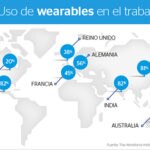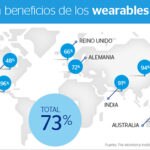Wearables, much more than just work gadgets
Over seven out of ten people believe there is at least one benefit to using some type of technology at work… but what about wearable technology?

Efficiency. Productivity. Safety. These are not only three of the pillars of the workplace but also three of the areas where wearable technology can benefit the workers that use them, according to data collected by the Workforce Institute at Kronos Incorporated and Harris Poll after conducting a questionnaire to find we are using this wearable technology in our everyday work.
“There’s a strong belief that wearable technology will take off in the workplace before the home because devices such as smart watches and even fitness and health monitors can provide organizations with uncharted data collection points to greatly improve safety, productivity, collaboration, and overall workplace effectiveness”, notes Joyce Maroney, director of Kronos' Workforce Institute.
We can therefore say that wearables are a new opportunity to obtain data about a worker's daily routine, so if the company analyzes these data (Big Data analysis), you can improve the output and efficiency of that routine.
Security and privacy
Workflows and productivity can be measured using the data collected from wearable devices worn by the workers. This application is considered by many to be invasive, as corporate policy is somewhat unclear, and there are no processes in place to protect both the employee's privacy and the company's security. This is the balance that has to be achieved.
In fact privacy and possible security failures are the two main concerns when asked about the "buts" of this technology. 44% of US workers questioned by the Workforce Institute consider that privacy could be a issue, whereas 35% believe there could be security failures that make the use of these devices a problem.
But let's take a look at the data found by this survey:

Font: BBVA Innovation Center
Over seven out of ten respondents believe that wearables could benefit or improve their work. Many workers agree that it could help them achieve the much desired balance between personal life and work and even favor collaboration and "friendly" competition in workplace.

Font: BBVA Innovation Center
According to the data shown in the graph, the potential of this type of technology is clear, as many of the respondents mention improved efficiency and productivity and improved safety among the benefits they find when using these wearable devices in the workplace.
Safety is one of the most commonly mentioned reasons for using this technology, particularly in countries like India (56%), Mexico (54%) and China (49%). However improving profitability, competition and customer experience and satisfaction are other reasons for using this type of wearable device.
What are the leading devices in the workplace?
Headphones, watches and armbands or smart wristbands are the three types of wearable devices considered most useful at work.
Although there's something for everyone… Around 20% of workers in the US, United Kingdom, France and Germany believe that they would find smartwatches useful at work, whereas this percentage is higher in China (56%), India (49%), Mexico (40%) and Australia (33%).
Among the main benefits to be obtained with these devices is a improved attendance at meetings, based on analyzing people's preferences and habits from data collected with the wearables
For example, another use being made of this real-time information and the analysis extracted from the devices is the improvement in the process of integrating employees in new departments by providing them with orientation and training manuals preloaded in a device which is issued to the employee and adapted to their needs.
And naturally wearables related with health and sport are also winners at work. Taking care of their employees' health is vital for a company that wishes to reduce absenteeism, and devices like Fitbit promote exercise and enable data tracking –for example to correct a worker's posture at their workplace or suggest using the stairs to get more exercise after a certain number of hours sitting down, or eating something healthy after a few days of fast food. The company can reward the healthiest decisions.